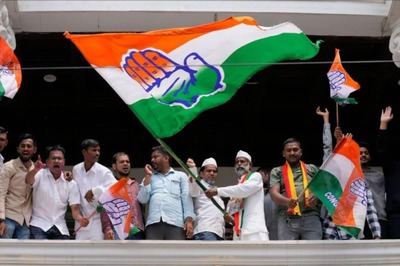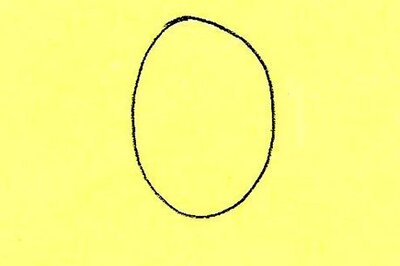
views
New Delhi/ Visakhapatnam: India's economy showed further signs of slowdown on Monday, with July factory expansion the weakest in 20 months, a government panel cutting its growth forecasts and its top carmaker posting a steep drop in sales.
But Reserve Bank of India (RBI) Governor Duvvuri Subbarao, who last week surprised markets with a steeper-than-expected interest rate increase of 50 basis points, India's 11th rate rise since March 2010, stuck to his anti-inflationary stance.
"We need to raise rates in order to restrain inflation. That hurts growth. So people say, are you not hurting growth in order to contain inflation? Our response is that, you need to restrain inflation in order to ensure that our middle-term growth is sustainable," he said in a speech in south India.
Morgan Stanley became the latest bank to cut its outlook for Asia's third-largest economy, predicting economic growth in the fiscal year that ends in March of 7.2 per cent, down from 7.7 per cent earlier.
"A combination of factors - including persistently high inflation, higher cost of capital, a cut in the ratio of fiscal spending to GDP, a weak global capital markets environment, and the slow pace of investment - will cause a further slowdown in growth," Morgan Stanley economist Chetan Ahya wrote on Monday.
The HSBC Markit Business Activity Index , based on a survey of around 500 companies, fell to 53.6 in July from 55.3 in June, its third straight decline, although it remained above the 50 mark that separates growth from contraction for the 28th consecutive month.
Monday's PMI reading reflected the impact of a steady rise in interest rates as well as the dampening of demand from key markets such as the United States and the euro zone, which are reeling from their own respective debt crises.
A top government economic advisory panel on Monday cut its growth forecast for the fiscal year to 8.2 per cent, from a 9 per cent target in February. The RBI expects growth of roughly 8 per cent this fiscal year.
The panel said inflation will remain around 9 per cent until October, and ease to 6.5 per cent by March, adding that the central bank "will have to continue a tight monetary policy till inflation shows definite signs of decline."
The prime minister's Economic Advisory Council also said that fiscal targets set in the government's annual budget "present a significant challenge."
It said India's fiscal deficit could touch 4.7 per cent of GDP in the year to March 2012, slightly above New Delhi's target of 4.6 per cent, and advised stronger measures to increase revenue and cut spending.
Economists have long been skeptical of the deficit target.
"We see challenges not just from expenditure but also in terms of revenue," said Shubhada Rao, chief economist at Yes Bank in Mumbai.
India grew at 8.5 per cent in the year that ended in March.
Economists have trimmed their growth forecasts for major Asian economies, including China, for this year and next.
COSTS, RATES WEIGH
Despite the Indian central bank's steady increase in rates, which makes it one of the world's most aggressive inflation-fighters over the past year, wholesale price index inflation was 9.44 per cent in June.
Inflation is being driven by structural pressures on food prices as rising incomes lead to better diets; crude oil and commodity prices; and wage and demand pressures, Subbarao said during a university lecture in south India.
Bond yields and swap rates rose after his remarks, which reinforced expectations of further rate increases.
Indian banks have been passing on increases in policy rates to borrowers, making credit more costly and deposits more attractive. Loan demand as a proportion of deposit growth in India has shriveled to 34.6 per cent in the current fiscal year, from 115 per cent at the same point a year ago.
CAR SALES SKID
Rising costs, interest rates and fuel prices also put a dent in Indian car sales, which had jumped 30 per cent in the fiscal year that ended in March.
Maruti Suzuki, which sells nearly half of the passenger cars in India, posted a record 25 per cent drop in sales in July as production of a popular sedan was crimped by a shift in its manufacturing facility.
Rival Tata Motors, which makes cars, trucks and buses, posted a 6 per cent annual decline in July unit sales excluding its Jaguar Land Rover brands.
India has seen a marked growth slowdown recently with industrial output growing at a relatively feeble 5.6 per cent in May; it's slowest in nine months.
The steepest fall in Monday's PMI report was in new orders, which dropped to 54.5 in July from 60.1 previously.
Input prices rose sharply in July, driven by higher raw material costs, causing manufacturers to charge more for their products, the survey showed. Sub-indexes for both input and output prices remained at elevated levels.
"These numbers confirm that inflation pressures remain firmly in place despite the ongoing moderation in growth. The RBI will, therefore, have to maintain its tightening bias for a while still to anchor inflation expectations," said Leif Eskesen, chief economist for India and ASEAN at HSBC.
India's parliament is set to tackle economic reforms in a legislative session that starts this week, but political wrangling and fallout from ongoing corruption scandals could strangle hopes for swift progress.















Comments
0 comment